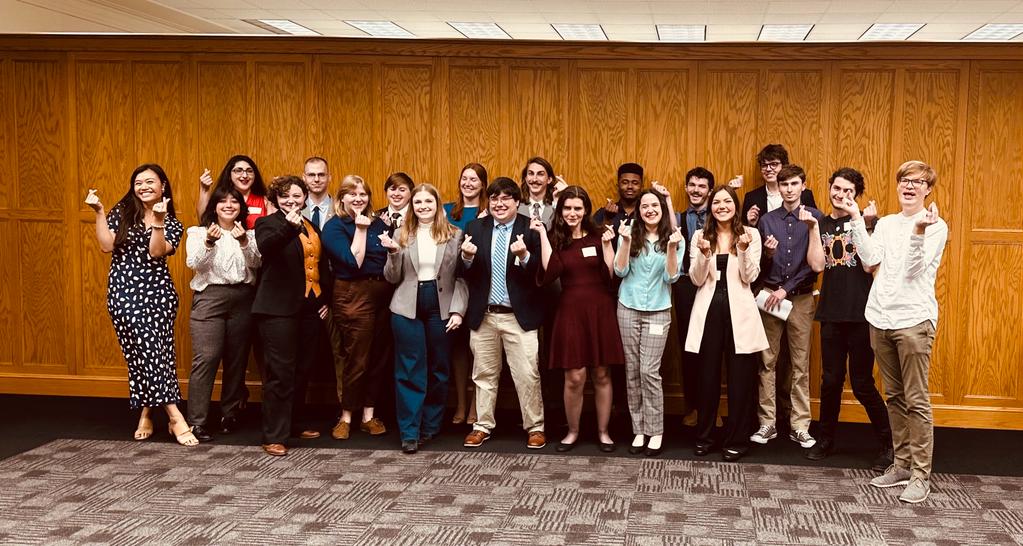
Graduating with Honors at the University of Florida
View the 2023 Honors Conference Program here!
UF has three types of honors designations:
- There is a university-wide Honors Program, which consists of the Freshman Honors Program and the University Honors Program. It offers wide-ranging intellectual, experiential learning, and outreach opportunities. It has rigorous completion requirements.
- “Honors” is also a designation for outstanding graduates of the university as a whole. Students who meet minimum upper-division GPA requirements (in CLAS, 3.5 or higher) automatically graduate with honors (cum laude). See Graduating with Honors
- Finally, individual departments offer specialized honors tracks for their outstanding majors. Upon completion of the program, a student is designated as graduating with either high honors (magna cum laude) or highest honors (summa cum laude).
History Honors Program
The History Honors Program is based around the writing of a 40-50-page thesis. A project of original historical research, the honors thesis is the most substantial piece of scholarly writing that an undergraduate can undertake. It must develop a clear and original argument and be of near-publishable quality; in fact, some theses have been published as articles in scholarly journals. Ideally, they are based on research into primary materials, though the choice of topic may dictate otherwise. A substantial historiographical essay is thus also a possibility, in which case secondary materials form the principle focus.
Outstanding students who are considering applying to graduate school in history are especially encouraged to write an honors thesis. But doing a thesis is also a valuable experience for students who love history but have chosen other career paths. A completed honors thesis can serve as a superb writing sample for graduate schools in all fields, professional schools (law, medicine, and business), and future employers. It stands as a clear demonstration of a student’s seriousness of purpose and proven excellence. For many students, this will be the last opportunity to immerse themselves in the past and grapple with a significant historical problem.
Students who participate in the History Honors Program are strongly encouraged to apply for the University Scholars Program, CLAS Scholars Program, departmental travel scholarships, and study abroad programs. Students in the Cambridge Program, for example, have conducted thesis research in British and European archives in while studying abroad (and several have received scholarships to pursue this research). In the process, they have received hands-on advising from history faculty in developing their topics, conducting archival research, and writing the thesis upon their return to Gainesville in the fall. Check out study abroad opportunities offered through the UF International Center. Many libraries and archives in the United States also offer short-term research
The Honors Program in History is unique at UF. In most departments, students who are writing a thesis have faculty mentors, but they work essentially on their own for one or two semesters. While the History Honors Program maintains an emphasis on independent study and self-direction, it also provides both a structure and a community for the completion of the thesis project. Honors students in History define their own topics, work one-on-one with faculty mentors, and spend countless solitary hours conducting research, writing, and revising. But, through the Honors Thesis Workshop (HIS 4971, 3.0 credits) in the fall and various activities in the spring, the program also offers systematic guidance and consistent support to each year’s cohort of students. Students receive mentoring from their advisors, the Honors Program Director (who teaches the Thesis Workshop), librarians, and graduate students; they also form close working relationships and friendships with one another. For these and other reasons, students in related majors such as Anthropology, Classics, International Studies, Jewish Studies, and European Studies, have participated in the program; any qualified student pursuing history-related research is welcome to apply.
The culmination and highlight of the History Honors Program is the Honors Conference, held annually in April. Students participate in panel presentations designed to showcase their projects and the work they have undertaken over the course of the year. Faculty, students, and family members engage in stimulating discussions about wide-ranging historical topics and enjoy a luncheon and awards ceremony. The 2024 Conference will take place on April 14, 2024 at Smathers Library 100.
History majors who earn an upper division GPA of 3.5 or higher and successfully complete the History Honors Program graduate with either high honors (magna cum laude) or highest honors (summa cum laude), depending on the quality of their thesis (see Honors Designations & Submission Deadlines).